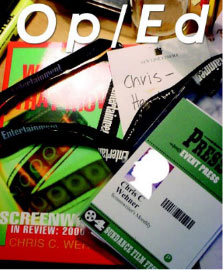
Modern Screenwriting: Style Over Substance
April 29th, 2004

"Today’s films are more than ever artifacts of light. Cars chase one another mindlessly along irrelevant freeways. Violence seems rooted in a notion about what ought to happen next on the screen to help images move rather than in any human situation anterior to those images. In fact, the human situation has been eliminated not through any intentional philosophic design but because those who have spent too much time with the cameras and machines seldom have much apprehension of that living world without whose presence there is no art."
�Gore Vidal
�
What is the state of screenwriting today? I think that’s an interesting question, and one worth some consideration.
Lets face it, today most of the movies we see are just plain bad. There hasn’t been a lot to get excited about lately (the last ten years or so.) I think the majority of professional screenwriters out there are not producing quality material. They’re collecting paychecks. I don’t blame them, I wish I could collect six-figures for some of the trash that is being written. I’m fed up, I’m disgusted, and I’m becoming less and less impressed when someone tells me they are a "professional screenwriter." They have a responsibility, don't they?
The argument could be they’re just doing their jobs. It’s the producers, the studio, hell even the audience that dictates what’s produced.
I think screenwriting has lost its edge. When was the last time these guys had to worry about a mortgage payment, or "can I afford that car?" We’re making millionaires out of less than talented people. They’ve gotten comfortable and fat on making money and the Hollywood lifestyle. From the big studio executives down the line to the screenwriter, they long ago forgot what makes regular folks tick.
But that’s not even what’s at the core the problem. It’s just sloppy, unimaginative, and vile screenwriting. Recently I interviewed one professional screenwriter and asked him what were some literary influences in his life? He could not name one. Do you remember when screenwriters had literary backgrounds as novelists or even playwrights? Ben Hecht, Preston Sturges, Donald Ogden Stewart, S.J. Pearlman, and the list could go on and on. How many professional screenwriters today do you think could pound out a decent novel? They’re not writers today, but merely facilitators. Often the best parts of a modern movie are the ones created by a technician sitting at a computer (CGI creation). (It's not surprising that writers like Alan Ball, and a few others, with literary backgrounds are our better writers. And why is it that most of the better writers today are flocking to cable and TV?)
We’ve got writers who think concepts and style is what’s important. At least that's how it appears. Either that or they’re just doing what they’re told. They get their abuse, swallow the pill, and take their paycheck and go home.
Hollywood has moviegoers addicted to the pantomime again. You could turn off the sound to most of these movies and not miss a thing. I actually would prefer it sometimes. Which I think is the desired effect, I’m very serious. They’ve been trying to do this ever since the introduction of sound. Back in the silent era, when movies were known as "flickers," people went to the movies. I mean they really "went" to the movies, daily, sometimes 2 or 3 times a day. Millions more than today on average, by far. It was at first pure fascination, but then it was addicting. The flickering lights, the darkness of the theater, it was an experience shared by a community of moviegoers. When sound was introduced no one knew what the hell to do. Suddenly movies had to communicate on a whole new level. It was a crossroads that ultimately made movies a complete visual and visceral experience. The Golden Age of screenwriting, if you will. With the introduction of special effects and CGI in the modern era, professional screenwriting has taken a step back again. Screenwriters are servicing concepts now, not narratives and characters. They really aren’t. No matter what they say. Oh I know, some of them aren’t, there are good writers out there, I know that, but if we have to lump them all together so be it.
I’ll take the screenwriting of the 1930s and 1940s over anything that’s being written today. Taking into consideration a time when writers were learning to use the medium, and how to most effectively tell stories, they were breaking new ground. What are they doing today?
�
THE CALLED IT "NARRATAGE"
First by the Fox publicity department and then New York Times movie critic Mordaunt Hall. They were speaking of Preston Sturges’ groundbreaking screenplay, The Power and the Glory, which was released as a motion picture in 1933. "It is neither a silent film nor a talking film," Sturges explained, "but rather a combination. It embodies the action of a silent picture, the reality of voice, and the storytelling economy and richness of characterization of a novel."
In 1998 the family of Preston Sturges published Three More Screenplays by Preston Sturges, the third such book. Included is a rare draft of the script; not a transcription, but the actual pages, some containing handwritten notes made by his secretary as he dictated his screenplays. There are lines crossed out�sometimes entire paragraphs�and alongside are his second thoughts and ideas for improvement. This is a rare look into the thought processes of one of Hollywood’s greatest screenwriters.
The Power and the Glory is a landmark screenplay for several reasons. First, it was written on spec as opposed to the common practice of the writer being assigned a story (Which was a big deal back then. You were assigned a story, almost always.) Second, when Jesse L. Lasky of Fox studios purchased the script from Sturges, he agreed to pay him a percentage of the gross, something that was unheard of at the time. Lasky’s acceptance of the terms isn’t surprising when you consider that he believed it to be "the most perfect script" he had ever seen. This, of course, caused an immediate uproar within the industry. Third, Sturges was also allowed on set, another almost unheard of thing at the time, working side-by-side with director William K. Howard as his dialogue director. Fourth, and perhaps most impressively, at a time when screenplays were worked on by upwards of a dozen different writers, Lasky ordered that no one touch Sturges’ screenplay. They filmed it as is.
But most importantly, Sturges’ screenplay was a cinematic revelation at a time when Hollywood movies were criticized for being "talky" and stagnate. They were struggling with this new medium.
The Power and the Glory told the dark and tragic story of the rise and fall of railroad tycoon Tom Garner, whose suicide sets the stage for the film. The story opens with his funeral and then shifts through time, moving back and forth according to Sturges’ unique narrative vision. The narrator is Tom’s boyhood friend and business partner Henry, whose narrative helps to tie all the story's leaps and bounds together. This style of storytelling convinced some critics and skeptics that film could recapture its cinematic artistry, and it did.
So today, are there such signs? I hope so.
Audiences are intelligent and need to be treated as such. Going to the movies is about an experience, not just escapism. (Sure, sometimes it’s all about pure escapism, but that’s not a good enough excuse for some of the screenwriting today.) We need young up and coming writers who want to write the next Midnight Cowboy, not the next The Fast and the Furious. We need more writers with something to say�a unique voice. Telling a great story that trusts an audience to "get it" without beating them over the head would be refreshing. Stories that not only have something to say, but force the audience to experience and feel something that has been forgotten or is new.
I thought a few screenplays recently came really close: Monster’s Ball, Training Day, Frailty, Changing Lanes, and even the over-hyped Memento. I think these are all screenplays that indicate that screenwriting can still be passionate, intriguing, conflicting, and complex. Stories where the audience isn’t treated as an addict or a child.
Is the screenwriter an innocent victim who is only doing what he or she is told? I hope so. Because then I have hope that there still are creative and literate writers out there who are trying to write great stories, instead of simply great moments. Movies are much more than something to marvel at. They can be much more than eye candy. They can be an experience. Sometimes that happens, but not near as often as it once did, even seventy years ago.
�-- Christopher Wehner Chris Wehner is a film critic for the Movie Review & Screenplay Database (www.iscriptdb.com), editor-in-chief (and publisher) of Screenwriters Monthly, author of Screenwriting on the Internet: Researching, Writing, & Selling Your Script on the Web (2000) and Who Wrote That Move? Screenwriting in Review: 2000-2002 (2003), script reviewer, and founder of ScreenwritersUtopia.com. He is also Vice President of Development for MoviePartners, Inc. He is currently developing (and writing) several projects for various companies. He has been involved with screenwriting for nearly 10 years and in many different capacities.
Chris Wehner is a film critic for the Movie Review & Screenplay Database (www.iscriptdb.com), editor-in-chief (and publisher) of Screenwriters Monthly, author of Screenwriting on the Internet: Researching, Writing, & Selling Your Script on the Web (2000) and Who Wrote That Move? Screenwriting in Review: 2000-2002 (2003), script reviewer, and founder of ScreenwritersUtopia.com. He is also Vice President of Development for MoviePartners, Inc. He is currently developing (and writing) several projects for various companies. He has been involved with screenwriting for nearly 10 years and in many different capacities.
Only logged-in members can comment. You can log in or join today for free!
No comments posted.
Advertisement

















